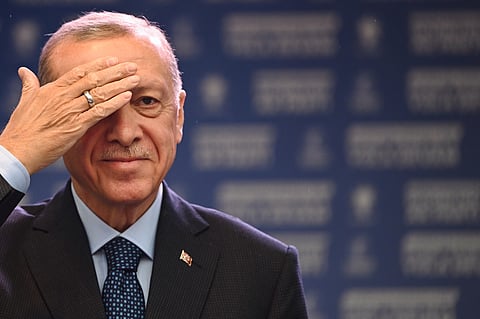Erdogan Falls Short Of Outright Victory In Turkish Presidential Elections, Heads For Runoff
Ankara, May 16 (TNA) Turkey's presidential race is headed for a runoff as incumbent President Recep Tayyip Erdogan fails to secure the majority required for an outright victory. Erdogan received 49.51% of the vote, while his main challenger Kemal Kilicdaroglu obtained 44.88%.
Despite the remaining uncounted overseas votes, which would have a negligible impact, Erdogan's votes would only rise to 49.54%. The outcome of the runoff will determine whether Turkey continues under Erdogan's rule or pursues a more democratic path promised by Kilicdaroglu.
Despite the remaining uncounted overseas votes, Erdogan's vote share would only increase slightly to 49.54%, making a runoff inevitable. The outcome of the runoff will carry significant implications for the future of Turkey. Erdogan, who has been in power for 20 years, aims to extend his increasingly authoritarian rule into a third decade, while Kilicdaroglu promises to lead the country on a more democratic course.
Prior to the elections, opinion polls suggested a potential end to Erdogan's reign, as a cost-of-living crisis and criticism of the government's response to a recent earthquake impacted his popularity. However, Erdogan's decline in support was not as substantial as expected. With his alliance retaining a stronghold in the parliament, Erdogan now stands in a favorable position to secure victory in the second round.
The news of the impending runoff had an immediate impact on the Turkish stock exchange, leading to a temporary halt in trading. The main index, BIST-100, initially dropped over 6% but later recovered some ground, closing 2.5% lower compared to the previous market close.
The runoff election, scheduled for May 28, will play a crucial role in determining the future trajectory of Turkey. As the nation awaits the final verdict, both candidates express confidence in their ultimate victory, leaving the Turkish population divided and uncertain about the path their country will take.
The international community and foreign investors closely followed the election outcome due to Erdogan's unorthodox economic policies and his influential role in major diplomatic negotiations. Turkey's strategic location, coastal access to the Black Sea, and borders with Iran, Iraq, and Syria, position it as a key player in various regional and global issues, including the war in Syria, migration flows to Europe, grain exports from Ukraine, and NATO's expansion.
With 99.4% of domestic votes and 84% of overseas votes counted, Erdogan's ruling Justice and Development Party and its allies seemed poised to maintain a majority in the 600-seat parliament. However, the assembly's authority has significantly diminished since a 2017 referendum granted additional legislative powers to the presidency.
Throughout the campaign, Erdogan employed divisive tactics, accusing Kilicdaroglu of colluding with "terrorists" and supporting "deviant" LGBTQ rights. In contrast, Kilicdaroglu campaigned on promises to restore democratic values, and freedom of speech, and address the country's economic challenges.

